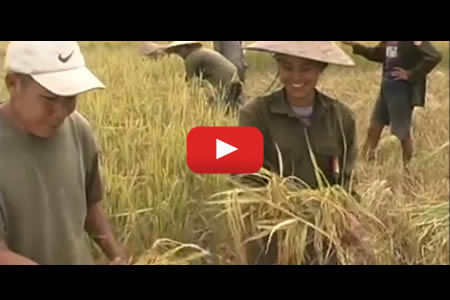IRRI Postharvest Training Accreditation
IRRI offers the participants of its 2 week postharvest training course to take a final exam. Provided that the participant passes the exam, IRRI certifies that the participant has demonstrated the skills and competencies listed below. These are the basic postharvest skills and competencies that IRRI requires from its own postharvest trainers in training courses conducted by IRRI in IRRI's partner countries.
Skills and competencies required for "IRRI Accredited Postharvest Trainer - Basic Level"
Demonstrated practical skills:
- Measure grain moisture content using quick moisture testers and the oven method
- Usage of the IRRI quality kit to determine grain quality and seed quality traits
- Usage various instruments tools to measure air properties such as temperature, relative humidity, air velocity and calibration of the instruments
- Demonstrate the settings and adjustments of agricultural machines (power thresher)
- Conduct a laboratory analysis of physical quality of paddy and milled rice and determination of the different milling fractions
- Conduct a seed germination test and determinate the major seed quality traits using the IRRI quality kit.
- Setting up of a hermetic storage system (Super bag), measuring oxygen content, and calibration of an oxygen meter
Competencies checked in the theoretical test:
- Grain quality: Knowledge about paddy quality traits, milled rice quality traits, cooking quality traits, their determination, the effect of varieties and the environment of the traits
- Seed quality: Knowledge about why good quality seeds should be used, seed quality traits, the difference between seed and grain quality, seed classifications, methods for germination and viability testing, and good practice for seed processing
- Knowledge about the recommended grain moisture contents for harvesting, threshing, storage of grains, storage of seeds, and for milling
- Knowledge about the hygroscopic properties of rice, equilibrium moisture content and the determination of safe storage conditions and about how high moisture levels affect grain quality
- Knowledge about the right time for harvesting, different harvesting methods, the range of losses in the different methods and best harvesting practices
- Knowledge about the importance of proper drying, different sun drying and mechanical drying methods (flat bed dryer, circular bin dryer, re-circulating batch dryer), their advantages and disadvantages and proper operating parameters for drying seed and drying grain
- Knowledge about the importance of safe storage, different storage systems (bag storage, bulk storage, hermetic storage), their advantages and disadvantages, storage management and storage pest management
- Knowledge about the rice milling process, grain fractions in the rice mill, different milling systems (hand pounding, single stage single pass mill - steel mill, two stage single pass mill - village mill, modern multi stage mill), their advantages and disadvantages, methods to evaluate and performance test rice mills and basic guidelines for rice mill maintenance
- Knowledge about rice standards and rice markets, quality traits as determined by different markets and consumers
- Basic knowledge about the purpose of business planning and components of a business plan
- Basic knowledge about the purpose of a project proposal and its components
During the training the participant has worked in a team of not more than 6 people on the following tasks:
- Estimate crop yield in a rice field using yield components, manually harvesting of a 25m² plot, threshing the harvested crop using a threshing frame, a pedal thresher and an axial flow thresher, driving a combine harvester and comparing the different harvesting systems
- Drying paddy using sun drying in comparison with one or more mechanical dryers, measuring drying rates and dryer performance and comparing milled rice quality as a result of the different drying practices
- Setting up hermetic storage systems including a cocoon with 5t capacity, a Super bag with 50 kg capacity and a hermetic storage system made from a locally available container. Measurement of the gas concentration inside hermetic storage. Assessment of commercial bag storage systems.
- Performance testing of different rice mills, determination of milling recovery, head rice recovery and white rice fractions
- Visits to processing sites and manufacturers of postharvest equipment.
- Visits to rice markets to assess quality and marketing channels
- Visit to the state of the art IRRI Grain Quality and Nutrition Center for sensory quality analysis and a rice cooking test
- Assessment of various business plans for the application of postharvest technologies
The participant must successfully complete five out of the practical tests and answer 80% of the theoretical questions right to get the certificate.
Visit the IRRI Postharvest Accreditation page to see the list of trainees who passed the basic exam. For queries, contact IRRI Postharvest at postharvest@irri.org or email rkb@irri.org.








